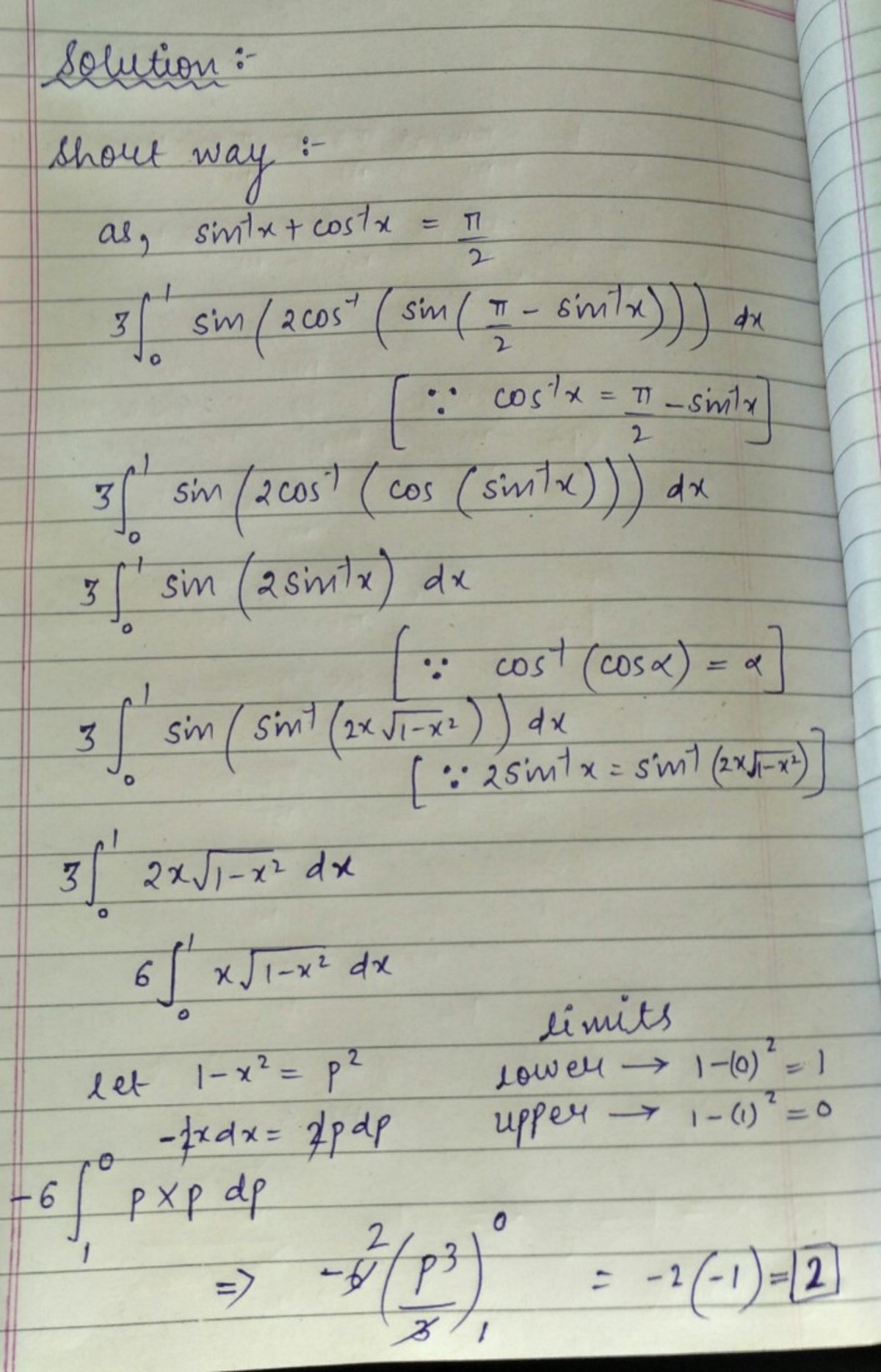Nested Trigonometric Integral
3 ∫ 0 1 sin ( 2 cos − 1 ( sin ( cos − 1 ( x ) ) ) ) d x = ?
Clarification : cos − 1 ( x ) = arccos ( x ) is the inverse cosine function.
The answer is 2.
This section requires Javascript.
You are seeing this because something didn't load right. We suggest you, (a) try
refreshing the page, (b) enabling javascript if it is disabled on your browser and,
finally, (c)
loading the
non-javascript version of this page
. We're sorry about the hassle.
3 solutions
3 ∫ 0 1 s i n ( 2 c o s − 1 ( s i n ( c o s − 1 ( x ) ) ) ) d x = 3 ∫ 0 1 s i n ( 2 c o s − 1 ( 1 − x 2 ) ) d x = 6 ∫ 0 1 s i n ( c o s − 1 ( 1 − x 2 ) ) c o s ( c o s − 1 ( 1 − x 2 ) ) d x = 6 ∫ 0 1 ( 1 − 1 + x 2 ) 1 − x 2 d x = 6 ∫ 0 1 x 1 − x 2 d x Using x 2 = u = > d x = 2 x d u 3 ∫ 0 1 1 − u d u = ( − 3 ⋅ 3 2 ( 1 − u ) 2 3 ] 0 1 = 2
Let θ = arccos ( x )
⟹ cos θ = x
Using sin 2 θ + cos 2 θ = 1 ,
⟹ sin 2 ( cos − 1 ( x ) ) + x 2 = 1
⟹ sin ( cos − 1 ( x ) ) = 1 − x 2 .
Hence the integral becomes 3 ∫ 0 1 sin ( 2 cos − 1 ( 1 − x 2 ) ) d x .
= 6 ∫ 0 1 sin ( cos − 1 ( 1 − x 2 ) ) cos ( cos − 1 ( 1 − x 2 ) ) d x (Double angle formula)
= 6 ∫ 0 1 sin ( cos − 1 ( 1 − x 2 ) ) 1 − x 2 d x .
Now let α = cos − 1 ( 1 − x 2 )
⟹ cos ( α ) = 1 − x 2
⟹ sin 2 ( α ) + cos 2 ( α ) = 1
⟹ sin 2 ( cos − 1 ( 1 − x 2 ) ) + 1 − x 2 = 1
⟹ sin ( cos − 1 ( 1 − x 2 ) ) = x .
The integral is now equal to 6 ∫ 0 1 x 1 − x 2 d x which can be easily evaluated by letting u = 1 − x 2 :
d u = − 2 x d x .
When x = 0 , u = 1 and when x = 1 , u = 0 . So finally:
− 3 ∫ 1 0 u d u
= 3 ∫ 0 1 u 2 1 d u
= [ 2 u 2 3 ] 0 1 = 2 .
I did the same way.
